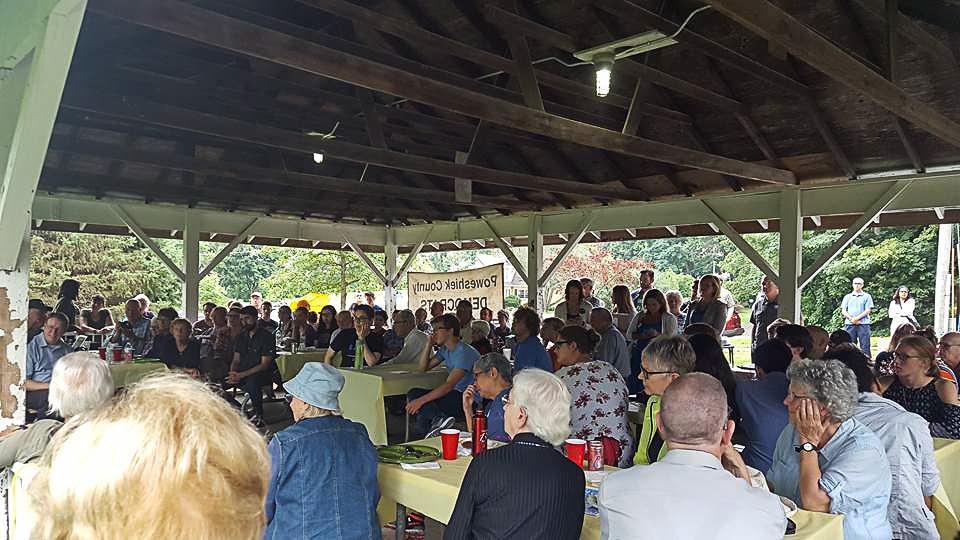The Poweshiek County Democratic Party held their annual picnic in Merrill Park last Sunday, Aug. 27, featuring special appearances and speeches by the wide array of Democratic candidates seeking political office in Iowa in 2018. Present at the event were three candidates to represent Iowa’s first district in the U.S. House, including Thomas Heckroth, George Ramsey and Courtney Rowe, as well as a representative from the Abby Finkenauer campaign. There were also five Iowa gubernatorial candidates in attendance, including Fred Hubbell, Andy McGuire, Jon Niederbach, John Norris and Ross Wilburn, as well as representatives from the Nate Boulton and Cathy Glasson campaigns. Despite a rain shower an hour into the event, the picnic was well-attended and provided community members with the opportunity to meet and size up the candidates.
Rob Hogg, a state senator for Cedar Rapids and leader of the Iowa Senate Democrats, emceed the event, introducing each speaker and beginning the picnic by emphasizing the importance of electing Democrats to the state legislature. Hogg recalled recent upsets in the Iowa political system under a Republican-run government, especially tax breaks for the wealthy and cuts to healthcare, education, social services and environmental protection programs, which remained a constant theme throughout the evening.
“This year was worse than my worst nightmare, with a tax on workers, a tax on healthcare, a tax on public safety, a tax on the environment, a tax on students and teachers,” Hogg said. “It’s really not what Iowa is all about.”
Hogg’s introduction was followed by another preliminary speech by Blair Lawton, the organizing director of the Iowa Democratic Party. Lawton summarized the five chief goals for the Party, which include assessing opportunities for growth, working with county Party officers across the state to write county specific plans, ensuring political action in 2017, establishing a communication infrastructure and reaching out to allies across the state. Lastly, Lawton reemphasized the importance of electing a Democrat to replace Republican Sen. Rod Blum in Iowa’s 1st Congressional District.
“This is a district that should be represented by a Democrat. We see Congressman Blum over and over go the wrong way on issues, and at the same time he continues to hide from his constituents,” Lawton said. “We have a really good opportunity here to turn this district blue in 2018 as well as take back the governor’s mansion, but that means we’re all going to be working together. That works starts today.”
The congressional candidates then spoke in alphabetical order by last name. Abby Finkenauer, a state House representative for Iowa’s 99th District, was spoken for by Joe Zahorik, the political coordinator for the Iron Workers Local 89 union in Cedar Rapids. In an unprecedented move this year, Local 89 publicly endorsed Finkenauer for Congress because of her commitment to union rights.
“She grew up in a union household, her dad was a welder, so she already knew the benefits and values that come along with organized labor,” Zahorik said. “We fully endorse her, the first time that we’ve done that as a local [union].”
Candidate Thomas Heckroth followed, a former staffer for Sen. Tom Harkin, who shares a focus on workers and unions. Heckroth recounted his experience fighting for agriculture, education and labor issues under Harkin and for the Obama administration. His platform involves quality public schools, affordable college education, fair wages, research into new technologies, a reformed farm bill and modern infrastructure.
“I’m running for Congress because we need an economy that values work more than wealth,” Heckroth said. “Iowans are working harder and harder and not getting ahead because we haven’t made the investments necessary to spur innovation, growth and higher paying jobs.”
Next up was George Ramsey III, who served 23 years in the U.S. Army and now works at a human services agency. He pulled upon his experience as a soldier to explain why he will be able to accomplish reform in Washington. His campaign emphasizes action over promises and the fight for civil liberties.
“We’ve got to do something to make sure that the person who is chosen to represent us is going to be able to go to Washington D.C. and get things done,” Ramsey said. “As a soldier, someone who has dedicated most of his life to being able to accomplish his mission, I will go to Washington D.C. and I will not stop until the work is done.”
The last congressional candidate to speak was Courtney Rowe, a Cedar Rapids engineer, who has spent her adult life volunteering for local political organizations. She referred heavily to the first time she volunteered for a campaign in Phoenix, AZ, fighting against a proposition that attempted to ban domestic partnerships. Rowe highlighted this success as the first time the LGBTQ community defeated a constitutional ban at the ballot box. She pointed to this example of a midterm Democratic Party success as reason to push in the midterms again.
“Democrats aren’t known for our midterm turnout. That’s why Republicans promote these hateful bills [during midterms], because they think it will drive up turn out for their party,” Rowe said. “Whatever candidate you’re passionate about, whatever issue you’re passionate about, please take the time to volunteer.”
Rowe added that her campaign will not accept any PAC or super PAC money. Her campaign platform emphasizes anti-PAC policies, Medicare for all, a 15 dollar minimum wage, free education and clean water.
The gubernatorial candidates were up next. The first speaker was Andrea Boulton, who spoke on behalf of her husband and candidate Nate Boulton. Boulton is a representative for the Iowa Senate’s 16th district, and has actively worked over the summer to fight for collective bargaining despite the obstacles imposed by the Branstad-Reynolds administration. Boulton also co-sponsored a bill for all four-year-olds to attend preschool and a water bill that attempted to activate Iowa’s Water and Land Legacy Trust Fund, which was voted for with overwhelming approval in 2010 yet remains unfunded today.
“Nate was at the Capitol, often late into the night, leading the charge against the very hurtful and divisive Republican agenda,” Andrea Boulton said. “They were on the Senate floor for 26 hours, pushing back to ensure that working class families have a voice.”
Next up was Fred Hubbell, a retired Des Moines business executive. Hubbell emphasized his business and philanthropic background as a skillset that will allow him to tackle the Iowa state budget, which stood at a $927 million surplus in 2012 and could drop to as low as a $350 million deficit for the fiscal year. In his business practices, Hubbell has also helped open Planned Parenthood facilities in Iowa and funded social services and education.
Hubbell was followed by Andy McGuire, the former chairwoman of the Iowa Democratic Party who oversaw the 2015-2016 Iowa caucuses campaign. Drawing upon her background as a physician, McGuire emphasized healthcare and mental health in her speech.
“We are 50th in mental health beds, 47th in providers,” McGuire said of Iowa’s mental health resources. “We actually have made the police be our first line mental health providers. … I want to take that money and put it into counseling, so that we can take care of our citizens before those crises happen.”
Grinnell alumnus Jon Neiderbach ’78 spoke next. Neiderbach’s speech differed from the other candidates’ in that he emphasized his qualifications over his competitors rather than their shared Democratic values.
“No one running now, or running during the time I’ve been in Iowa, really has a more thorough knowledge of Iowa government than I do. I’ve been in law, I’ve been involved in government, I’ve been in nonprofits,” Neiderbach said. “I don’t think voting for Democrats automatically solves anything.”
Candidate John Norris then spoke about his extensive political resume and the dire fiscal situation in the Iowa state government. Norris also previously worked for Sen. Tom Harkin, served as state director of the Iowa Farm Unity Coalition, chaired the Iowa Democratic Party during Gov. Vilsack’s historic win and worked for the Obama administration’s Federal Energy Regulatory Commission. After Norris was Ross Wilburn, the former mayor of Iowa City, whose campaign also emphasizes equality in education, healthcare and fighting against corporate tax breaks.
The last of the gubernatorial speeches was from Kate Revoe, the political coordinator and representative for Cathy Glasson’s campaign. Revoe spoke of Glasson’s experience as a nurse for over 20 years and as president of Iowa’s SEIU 99, which represents many workers in healthcare and other service-sector jobs. Revoe spoke to Glasson’s personal understanding of workers’ and union issues.
After the 1st District and gubernatorial candidates had all spoken, two more candidates running for political office in Iowa spoke. First was Deidre Dejear, who is running for Iowa Secretary of State, followed by Grinnell alumnus Austin Frerick ’12 who seeks to represent Iowa’s 3rd District in the U.S. Congress.
Although the picnic lasted nearly two hours, the audience remained engaged in the candidates’ speeches and the issues they represented. Though the primary for the gubernatorial, congressional and state legislative races is not until June 2018, party-organized events early on help to increase voter turnout and provide time for voters to consider their options.






























































